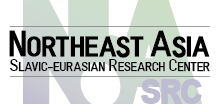SRC-HOPS Joint Border Studies Summer School 2016
The Slavic Eurasian Research Center (SRC), together with the Graduate School of Public Policy (HOPS), and in conjunction with the Association for Borderlands Studies Japan Chapter (ABSJ), held its 2016 Border Studies Summer School from July 25-28. Over 50 people from 20 countries attended the 4 day summer school.
The first day kicked off with opening remarks and a lecture by the two chief organizers, Naomi Chi and Akihiro Iwashita, which offered a history of how border studies in Japan had been developed through a grant-in-aid project "Reshaping Japan's Border Studies" and how the first series of border studies summer school had been an important educational programme created within that project. The current summer school marked the beginning of a 2nd series of border summer schools, this time made possible through the framework provided by the Hokkaido Summer Institute established by the Office of International Affairs of Hokkaido University. In the afternoon, Alexander Diener (University of Kansas), author of Borders: A Short Introduction (OUP, 2012), set the thematic tone and framework for the 4 day course by providing an overview of border studies, looking more specifically at the dynamics of place making and key concepts in studying borders, as well as offering a historical geography and biography of borders in which he focussed on the Russian enclave of Kaliningrad. In the second part of his lecture he focused on normative and ethical considerations involved in border studies. The final lecture, by Akihiro Iwashita, examined territorial issues in Northeast Asia, including those between Japan and Korea, Russia, China and Taiwan.
The second day started with David Shim (University of Groningen) focusing on images of border, and particularly those of the Democratic People's Republic of Korea (DPRK). This lecture explored images as legitimate objects of analysis and the "politics" of and behind images. The second lecture, by Shinkichi Fujimori (SRC), analyzed the micro and macro political economy of unrecognized states such as Moldova (Transnistria) and Donetsk and Luhansk. The third lecture, by Shinichiro Tabata (SRC), focused on the economic development of Russia's Far North, particularly on the opportunities and possibilities for economic development as well as the risks of and challenges to the development of these Arctic region. The last lecture was a showing of the documentary Hafu, which focuses on the lives of 5 Japanese citizens of mixed race and their experiences in Japan. The notion that Japan is a homogenous society was and is of course a myth but that constructed image retains its power in contemporary Japanese society and the students learnt about those who suffer because of the strong belief in this myth.
The third day kicked off with Paul Fryer's (University of Eastern Finland) lecture on migration in Europe. He particularly focused on the Finnish view of the migration crisis in Europe and pointed out that the mixed approach by Finland to the refugee crisis reflects the splits in and social polarisation of EU society, while emphasizing that Finland will continue to follow a very narrow interpretation of EU policy on refugees in order to appease all sides involved in its domestic debate. The second lecture was offered by Naomi Chi (HOPS) who examined issues of migration, demographic change and ethnicity in Japan and Korea, and analyzed particular spaces of "multiethnic" coexistence in both countries. Although rapidly aging societies in both countries has led to calls for the "immediate" implementation of policies that promote the movement of labour into these countries, very restrictive policies, social polarisation and the politics of exclusion continue to make both countries difficult to access for migrants, despite the strong demand among Asian labor migrants wishing to work in these East Asian economic giants. The third lecture, by Joni Virkkunen (University of Eastern Finland), looked at borders and cultures, particularly the foodscapes of Central Asian migrants to Russia. He explored the multiple meanings of food, the "in-between spaces" of migrant lives represented in migrant cafes, consumerism, and the globalizing of tastes and foods changing urban spaces in Russia. The last lecture of the third day was offered by Tetsuro Chida (SRC), who talked about borders and the environment, and focussed on the Aral Sea issue in Central Asia. One of the things emphasized in his lecture was that although the crisis occurred during the Soviet era due to the failure of the Soviet-styled modernization policies in Central Asia, the situation around water resources deteriorated even further after the five Central Asian republics obtained independence and sovereignty. The politics of scale in the Aral Sea case have prevented actors at various scales from adopting well-coordinated and comprehensive measures.
On day four, the final lecture was provided by Chisato Abe, an Ainu activist who works for the Ainu Indigenous Peoples' Film Society. She gave an overview of the history of Hokkaido from the perspective of the Ainu, the current status of the Ainu in Japan and the challenges they face in today's society. Particularly, she emphasized that although the cultural heritage of Ainu is being promoted through various measures, there was a need for greater efforts by the Japanese government to fully recognize the Ainu and their rights as an indigenous people of Japan. This was followed by a tour of the Hokkaido University Museum, which had reopened earlier that week on July 26. The final two sessions were devoted to group presentations by the student participants, which enabled them to put forward their vision of what the world would be like in 2030. The presentations had been prepared over the four days of the course, but all of them were unique and thought-provoking and offered a range of views regarding the outlook for migration, territorial disputes, information technology and security issues.
The last day of the summer school on 30 July consisted of an excursion to the Ainu village and museum Porotokotan in Shiraoi and the art community in Tobiu. The art community is a very special place for the organizers of the summer school as Shoko Usami, a former colleague at Hokkaido University who had passed away at a mere 33 years of age, had been actively involved in this community. Kineta Kunimatsu, the director of the community, introduced the community building taking place in Tobiu town through art and the work they have done so far. Our special thanks to Kineta Kunimatsu and Shoko Usami's mother, Shigemi Usami, for their hospitality and for taking the time to give us a tour of the community. Shoko Usami is remembered by her friends and colleagues.
The chief organizers would like to thank the students who participated in the summer school, the lecturers for their excellent lectures, the administrative staff members, and everyone who was involved in the preparation, operation and management of the summer school. Please check the UBRJ website from time to time for the call for registration for next year's summer school! (Written by: Naomi Chi)
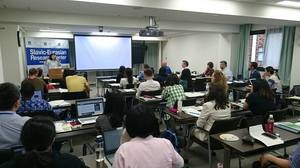
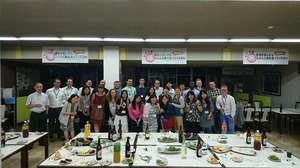
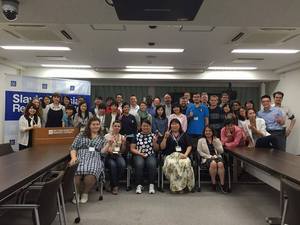
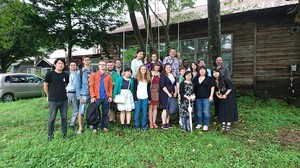
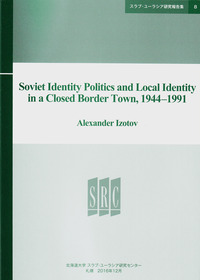 Slavic Eurasia Papers No. 8 "Soviet Identity Politics and Local Identity in a Closed Border Town, 1944-1991" Published On-Line
Slavic Eurasia Papers No. 8 "Soviet Identity Politics and Local Identity in a Closed Border Town, 1944-1991" Published On-Line
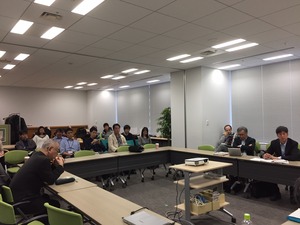
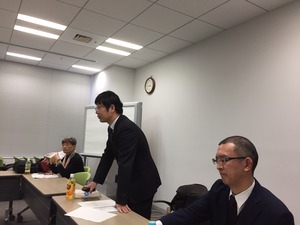
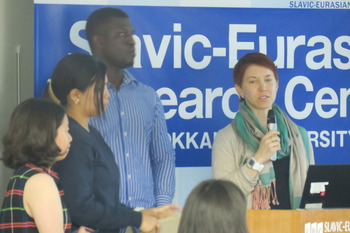




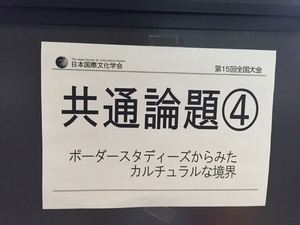
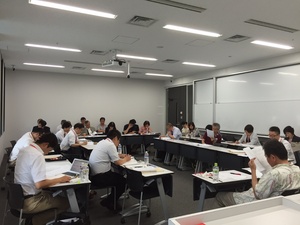
 Eurasia Unit for Border Research (Japan)
Eurasia Unit for Border Research (Japan)




